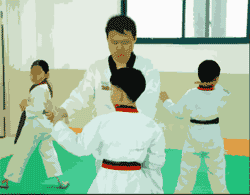| |

5-3. Central Pose
Discussiong the pose in techniques, the way of Saram appears itself as keeping
your central pose. Here, to keep your central pose is to return continuously
to the basic pose of Kyorugi, and to its genuine stable spirit.
Because the substance of Man(Saram) is his will of intending to do something
genuinely the factor of Saram is what you intend to do. What you intend to do
in Taekwondo as a system of fighting techniques is to protect yourself suppressing
your opponent, which is to strike at his weak part and avoid his strong part.
Thus, it means keeping offense at him with defense of yourself, namely continuous
offense at him with continuous defense of yourself on the other hand. For the
sake of its continuity ¡°you should
return to your core naturally and immediately from each movement.¡±(Ch.12)
 |
|
<For
the way of Saram, you should know exact pose of Taekwondo.>
|
Here, ¡°the core, referred in the
way of Saram(Man), means your own perfect pose which allows most possibility
to adapt yourself to each situation.¡±(Ch.12) To
return immediately to a settled pose which is the core of each motion of yours
in perfect balance despite endless changes and motions, or to make your position
firm staying in your complete balance and stability; it is the way of Saram(Man)
in Taekwondo(Ch.12) It is possible for you to get the offense and defense
in the continuous return to the basic kyorugi pose only when you can harmonize
the offense and defense with the pose of kyorugi. You can get it through<Oneness
of Haneul and Tang in Saram>.
By the way, to continue attack and defence preserving what you intend to do
like this, it is verily an attachment. In this attachment, however, you should
know you have nothing to be attached to, and no self that would be attached.
So you can know the attachment is empty. This is why you can be free from the
attachment even in it. "Therefore his liking was one and his not liking
was one. His being one was one and his not being one was one. In being one,
he was acting as a companion of Heaven. In not being one, he was acting as companion
of man. When man and Heaven do not defeat each other, then we may be said to
have the True Man."1) This is taught by
Buddhists, saying as; "wheresoever are material characteristics there is
delusion; but whoso perceives that all characteristics are in fact no-characteristics,
perceives the Tathagata."2)
<footnotes>
1) Chuang Tsu, ´ëÁ¾»ç 1, ͺÐìû¿ñýå¥ìé,ÐìÝ×û¿ñýå¥ìé. Ðììéå¥,ÐìÝÕìéå¥. Ðììéæ¨ô¸êÓÓù,ÐìÝÕìéæ¨ìÑêÓÓù.
ô¸æ¨ìÑÝÕßÓãå¥,ãÀñýêÝòØìÑ.
2) Diamond Sutra, 5. ÝÖͱ âÎÜÌð«. Ûíá¶êóßÓ ËËãÀúÈØÍ. å´Ì¸ð³ßÓÞªßÓ
öÎ̸åýÕÎ.
|
|